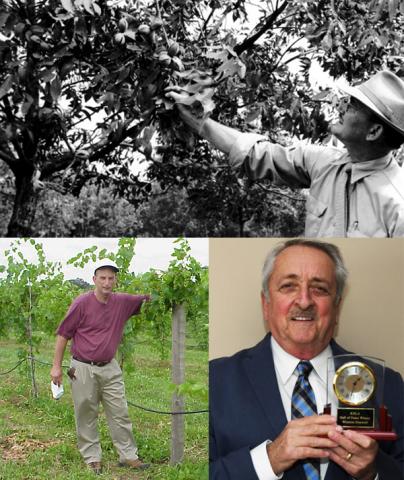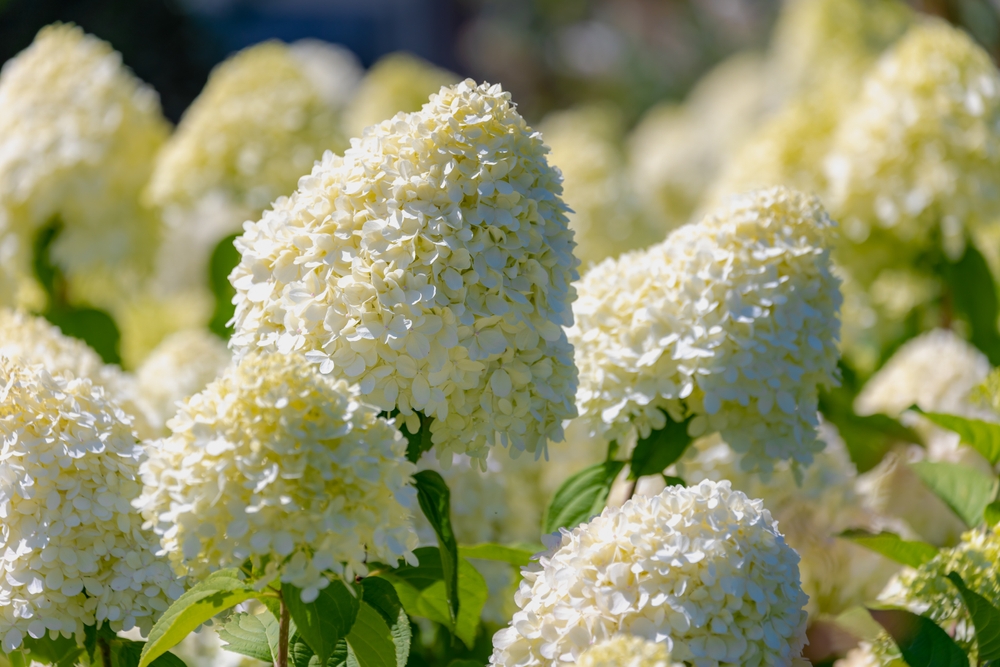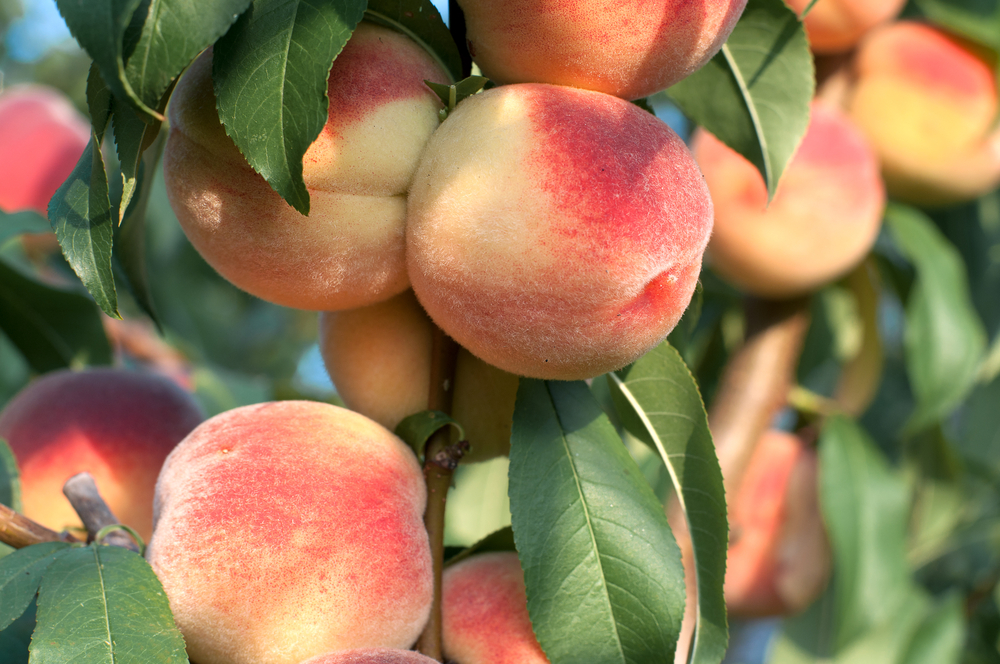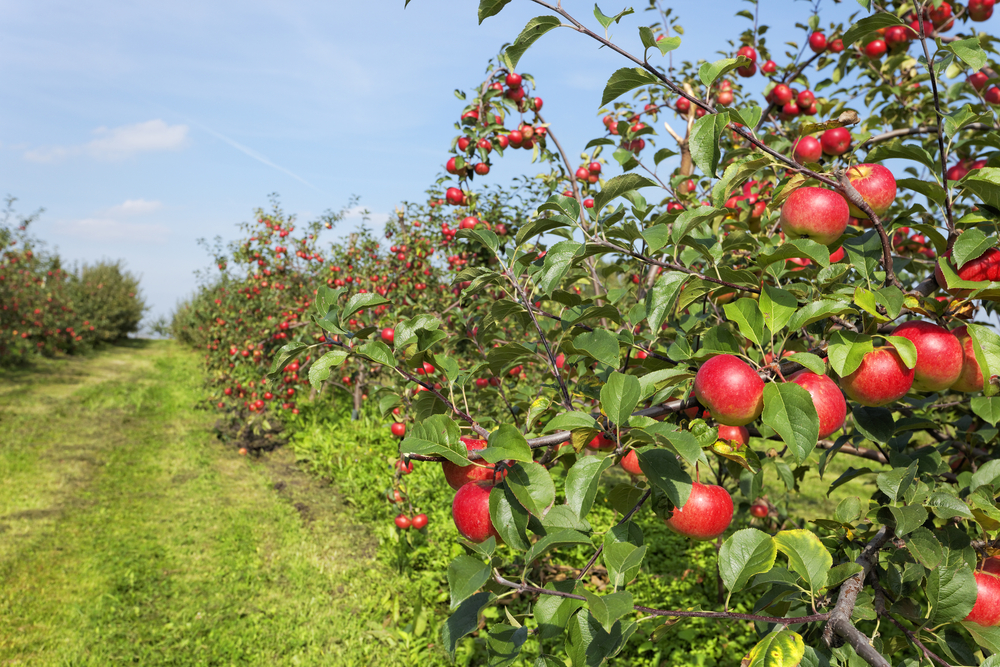100 Years of Research at UKREC: Fruit and Vegetable Work
100 Years of Research at UKREC: Fruit and Vegetable Work
Published on August 7, 2025
The horticulture program at UKREC began in 1925 through the Kentucky Agricultural Experiment Station and Cooperative Extension Service, when superintendent Samuel Lowry planted an acre of tomatoes. Within the first few years, the station had planted more than 1,000 peach and apple trees, as well as plots of strawberries and raspberries, reflecting growers' interests across Western Kentucky.
Lowry’s reports stated that research in the early decades emphasized variety trials, soil fertility, pruning, pest control and cultural practices tailored to regional conditions. In response to commercial and home plantings of apples, peaches, pears, plums, strawberries and bush fruits, UKREC positioned itself as a valuable source of tested recommendations and hands-on expertise.

By 1938, horticulture research intensified under W.D. “Army” Armstrong, who launched 22 projects that year alone. His efforts helped expand UKREC’s fruit research acreage to a commercial scale for data collection and regional distribution.
Armstrong, the first research scientist stationed full-time in Princeton, assisted in the development of the “Harken” peach cultivar and introduced noteworthy trials in apples, strawberries, grapes and sweet potatoes. He spearheaded significant apple rootstock research and coordinated spray services for orchards. He also explored native walnut and pecan groves to identify promising hybrids, including the “Bank” pecan, which originated from a tree growing near a Princeton bank.
Following Armstrong’s retirement in 1974, UKREC hired extension horticulture specialists Gerald Brown and Winston Dunwell. Brown continued the fruit program, and Dunwell was hired for his expertise in nursery and landscape plants, or so he thought.
“While Dean Barnhart was very supportive of a nursery crop program, they really needed a vegetable specialist, and I had to learn it quickly,” Dunwell said.
A native of the Hamptons in Long Island, New York, Dunwell mused that the University of Kentucky must have thought he was a potato specialist since he earned his Ph.D. from the University of Idaho.
In the 1980s, Dunwell and research specialist Dwight Wolfe supported several commercial vegetable growers, such as Gerald Moore of Kentucky Vine-Ripe Tomatoes in Calvert City and potato grower Gary Cecil in Owensboro.
“I was able to develop many friendships and contacts with my vegetable work, and I still check on some of them regularly,” Dunwell said, who recently visited Steve Wurth of Wurth Farms in Paducah.
Dunwell explained that commercial vegetable production was risky due to labor costs and pest pressure, and much of the business eventually went to surrounding states. As producer needs changed, Dunwell said they looked at the success of growing other crops.
“We tried growing carrots, and they grew really well, and I was stunned,” Dunwell said, “but profit margins were small. We focused on what could be marketed locally.”
Under Dunwell, the nursery and ornamental crop research and extension programs also grew. The establishment of demonstration plots for native plants supported evaluations of southern species in Kentucky landscapes.
Dunwell also gives credit for UKREC’s horticulture program success to collaboration with station extension entomologists. Harold Raney, the station’s first entomologist hired in 1970, instituted an Integrated Pest Management (IPM) program to help farmers better manage crop pests during the growing season. The program was led by Doug Johnson from 1980 to 2015, and is currently coordinated by Ric Bessin on the Lexington campus.
“Integrated Pest Management is an important part of the horticulture program at UKREC,” Dunwell said. “It allows for a lot of significant extension work and the ability to report it in a coherent way.”
With the help of the IPM program and funding from the U.S. Department of Agriculture’s National Institute on Food and Agriculture, Dunwell assisted in developing the first IPM mobile app — IPMPro — tailored to nursery and landscape professionals. This innovative tool offered streamlined recommendations on horticultural practices, pests and disease management. They also launched a YouTube channel to share research-based solutions with farmers and stakeholders in accessible formats. The channel has more than 3,500 subscribers.
“I always thought that we were on the edge of what was technologically current,” Dunwell said.
Much of Dunwell’s work continued until the Dec. 10, 2021, tornado; he was scheduled to retire five days later.
Dunwell said many technicians and extension associates have been crucial to the program’s reach, working closely with growers, conducting field trials and maintaining community partnerships. This on-the-ground support has helped translate research findings into practical innovation across Western Kentucky.
Looking forward, UKREC’s horticulture program remains focused on helping farmers adapt to changing markets, climate conditions and labor needs.
According to horticulture extension associate Daniel Becker, future research will center on cultivar and production system evaluation that enhances crop diversity, labor efficiency and income during off-season periods. Fruit research will include thornless blackberry fertilizer and pruning studies, rootstock trials for apples and blueberries and hybrid grape testing. Vegetable work will explore overwinter and spring production in high tunnels, evaluate no-till systems and identify cultivars suited for local marketing.
As commercial horticulture consolidates nationwide, UKREC anticipates that remaining growers will require stronger tools and more specialized knowledge.
“Fewer commercial growers will exist, but their needs will be greater,” Becker said.
Research on integrated technologies — such as sensor-driven input tracking, plant performance modeling and breeding analytics — will be essential. Trials in high-density plantings, climate-adaptive cultivars and microclimate modification will continue to support resilience in Kentucky agriculture. Controlled environment horticulture is also expected to play a growing role in feeding expanding urban communities.
A 1966 UKREC report stated that horticulture was given a prominent place at the substation to reflect commercial and home plantings in Western Kentucky. While the current farming landscape in the region may reflect a stronger focus on grain crops, professor and Department of Horticulture chair Mark Williams said the UKREC program is still relevant.
“Through every research initiative and grower collaboration, the horticulture program at UKREC stays true to its founding mission: serving the growers of Western Kentucky with practical knowledge, scientific integrity and a commitment to agricultural success,” Williams said. “The next hundred years promise deeper innovation, stronger partnerships and a continued legacy of cultivating growth.”
Fruit Trials
1993-2004 Blueberry cultivar trial (8 cultivars)
1997-2006 Pome fruit variety trial (20 apple cultivars, 4 Asian pear cultivars)
1998-2006 Evaluation of Eastern European wine grape cultivars for Kentucky (17 cultivars planted in 1998 and 9 cultivars planted in 2001)
2000-2007 Wine grape cultivar trial (8 cultivars)
2000-2004 Blackberry cultivar trial (5 cultivars)
2003-2007 Weed control trials in apples and peaches (conducted in the 1997 NC-140 ‘Golden Delicious’ and 1994 NC-140 ‘Redhaven’ rootstock plantings)
2004-2012 Peach variety demonstration (37 cultivars)
2004-2005 Survival of blueberry cultivars in Western Kentucky (13 northern and southern highbush cultivars, 9 rabbiteye cultivars)
2005-2007 Weed control trials in grapes (conducted in the 1998 Eastern European wine grape and 2000 wine grape cultivar plantings)
2006 Evaluation of herbicide performance in newly planted pawpaw
2006-2008 Blackberry and raspberry trial (5 blackberry and 4 raspberry cultivars)
2006-2010 Blackberry cultivar trial at Princeton, Kentucky (5 cultivars)
2007 Weed control in bearing blueberry (conducted in the 2004 blueberry cultivar trial)
2013-2018 Erect thornless blackberry cultivar trial (5 cultivars)
2015-2024 Peach and nectarine cultivar trial (13 cultivars)
2017-2020 Performance of ‘Duke’ highbush blueberry growing in two container and three soilless substrate combinations
2022-present Hardy fig cultivar demonstration (7 cultivars planted in 2022 and 2025)
2023-present Altering cane removal and fertilizer application timing to reduce blackberry pruning labor
Vegetable Trials
1988 Watermelon cultivar observation trial; Spanish onion cultivar observation trial; Muskmelon cultivar observation trial; Cabbage cultivar trial
1990 Green bean observation trial for Western Kentucky; Tomato cultivar trial for Western Kentucky
1991 Processing tomato cultivar trial; Tomato cultivar observation trial for Western Kentucky
1994 Carrot cultivar evaluation; Fall broccoli cultivar response to freezing
1995 Fall production of summer squash cultivars
2003 Sweet corn variety trial, Western Kentucky (10 supersweet cultivars); Weed control in pepper and sweet corn
2005 Weed control in bell peppers; Weed control in no-till pumpkins; Observations on seedless watermelon varieties in Western Kentucky
2006 Weed control in no-till pumpkins
2007 Comparison of preemergence and postemergence herbicides in sweet corn; Evaluation of application of Command and Treflan under plastic mulch for pepper production; Evaluation of Sandea at three transplanting time in three cucurbit crops
2009 Fresh-market tomato variety trial (10 cultivars)
2010 Cabbage and Broccoli cultivar trial (9 broccoli and 5 cabbage cultivars)
2011 Bell pepper variety evaluation (7 cultivars)
2015 Fall Brussels sprouts and cauliflower cultivar trial in Western Kentucky (16 Brussels sprouts and 20 cauliflower cultivars)
2016 Fall broccoli cultivar trial (20 cultivars)
2017 Spring broccoli cultivar trial (20 cultivars), Fall broccoli cultivar trial (14 cultivars)
2019 Fall colored cauliflower cultivar trial (15 cultivars)
2020 Miniature pumpkin cultivar trial (12 cultivars), Beet cultivar trial (12 cultivars)
2023-present Overwinter production of Brussels sprouts cultivars in a high tunnel


